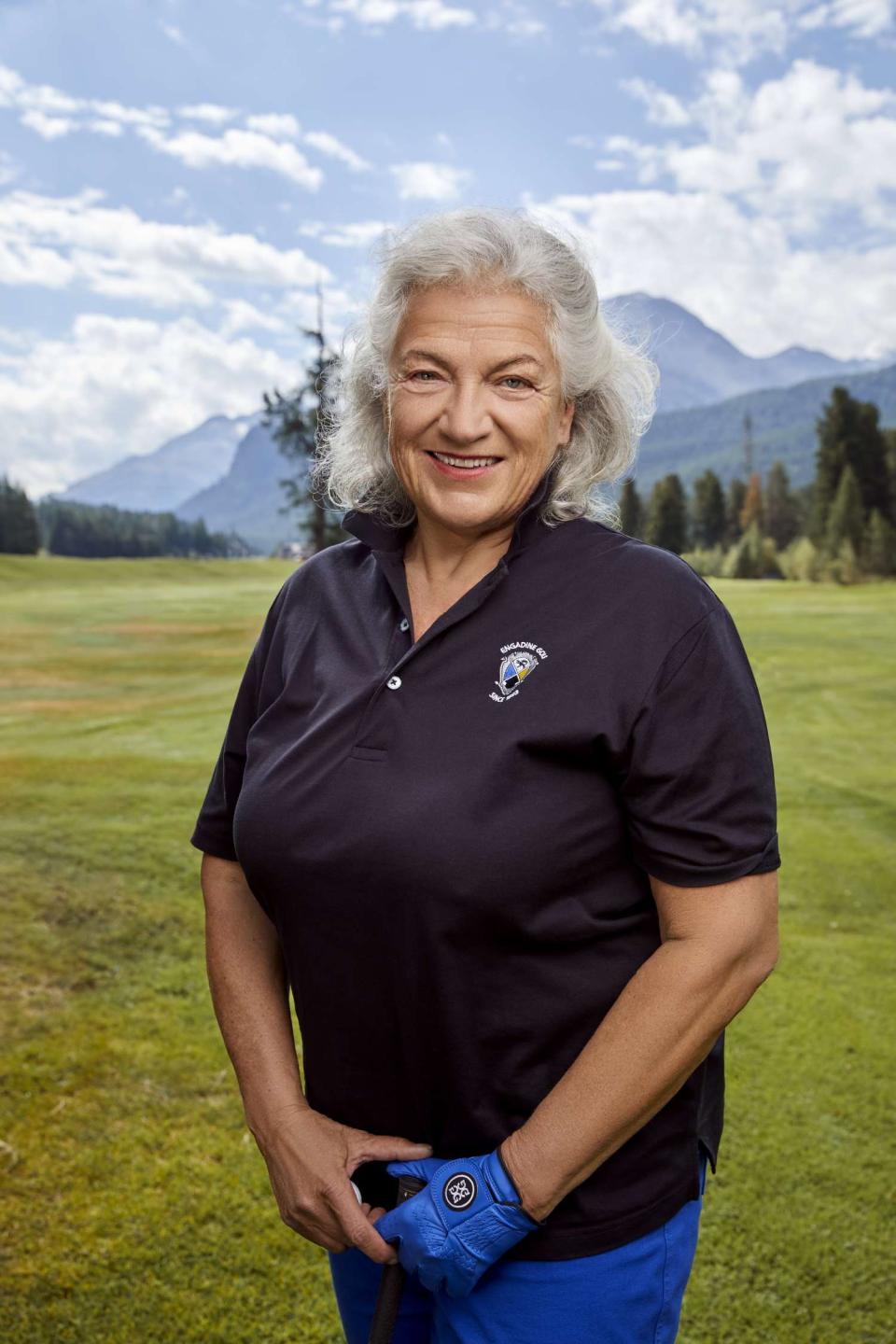
A stroke or two and it’s already clear that this round with Ellen Ringier is going to be quite special. Not because she’s doing credit to her reputation as a long hitter, triggering a kind of competitive instinct in me. Nor because her super-precise putts are pretty impressive.
No, this round promises to be a special one because it’s a chance to talk, which I’m very much looking forward to because her philanthropy is delightful, her charm captivating, her sense of humour amusing. Which results in a round that, putting it carefully, is not really the strongest game-wise, but certainly the most memorable of the year 2020.
But first things first. Ellen Ringier. Age: 69. Star sign: Sagittarius. Grew up in Lucerne. Her grandmother and mother fled from Austria to England during the Second World War. That kind of thing shapes generations to come. Ellen Ringier was also shaped by the credo that her grandfather, a London banker, lived by: All life is about: to give other people a chance.
Nearly 20 years ago, she founded the Elternsein (‘Parenting’) Foundation. She is the publisher of Fritz+Fränzi, and was personally responsible for selling advertising space for it for many years. The parenting magazine has won many awards and today has a circulation of over 100,000. She says: “My grandfather’s credo has become a kind of substitute religion for me: asking myself what I want to have accomplished by the time they nail the lid on my coffin. It’s not so much about me as about helping to making society that bit better. And anyone can do that. All it takes is little gestures in everyday life.” It was also her grandfather who got Ellen Ringier into golf. What would he say today, though? Silence. After the first hole, she says about her game: “Unfocused, but also unencumbered.”
Is it affirmative action that women tee off closer to the green than men?
“Women can play just as long shots as men. I can tee off from the men’s tees. Of course, not every woman can, but not every man has the longest tee shot either.”
Joan Crawford or Hellen Mirren?
«Hellen Mirren.»
Is the duty of cheerfulness towards one’s mother the hardest to fulfil of all duties?
“Did you say a duty of cheerfulness? And that in connection with one’s own mother? Wow.” After a brief pause for thought, she says: “There is no such duty. I’m an honest person. When I’m cheerful, I’m cheerful. If not, my mother notices.”

By now, we’ve arrived at the fourth. An eagle circles overhead. She’s had good and bad shots, she’s done what all golfers do from time to time, namely look for the stupid ball in the rough, but she doesn’t seem stressed or rushed, rather pleasantly distracted.
After the fourth hole, she comments on her game again: “Unfocused, but full of joy.” And then she adds: "Playing golf demands more. You can only play golf properly if you’re focused. As a child, that was a real problem. I was infamous for keeping talking on the tee.”
The photographer is busy capturing Ellen Ringier, everyone’s in high spirits and a glance behind us prompts the question of whether we should let the two players behind us overtake us.
Ellen Ringier looks over, pauses for a moment, says dryly: “Hmmm, they’re not playing that well.” With that, she turns back to the camera. She’s wearing blue. Basecap, gloves and trousers in a bright azure blue, and a polo shirt in dark Oxford blue. Psychologists say the colour blue stands for confidence, productivity and likeability. No coincidence, perhaps. Anyway, her blue is giving the sky quite a run for its money today.

She went to an all-girls school, a “young ladies’ finishing school” as she puts it. And she distanced herself very early on, she says, from the kind of classmates who played the girlie card with batting eyelashes and an unnaturally high voice. “I thought about it and said to myself: You don’t need to do that.” – always encouraged by something her mother said: Speak up if you have something to say. The word ‘influencer’ makes Ellen Ringier shake her head as if you were asking the Pope about Roman orgies. “What a perception of women: all long blond hair and botoxed lips, fixated on looks.”
Are these women undermining efforts at emancipation?
“Most definitely,” she says, “if you’re a young person who succeeds very quickly with a certain attitude and everyone tells you ‘Wow, you’re pretty,’ then the will to achieve intellectually diminishes dramatically. But there have always been women who have withdrawn into their femininity and thought: ‘If I can just find the right man, I won’t have to worry about a thing’.”
Do you have any female role models? (Normally you’d address her as Mrs Ringier, but she offered first-name terms as per golfing etiquette at the beginning of this round)
“Among many others, Queen Christina of Sweden made an impression on me when I was young. She stubbornly refused to marry at an early age. Which was an expression of maximum strength back then in the 17th century. She must have driven the whole of society crazy with that.”

There are doubtless many things that Ellen Ringier does not have in common with Christina of Sweden. For example, wearing men’s clothes. Telling vulgar jokes. Or closeness to the Vatican. But there’s one thing she does have in common with her: standing up for what she believes in. If a racist remark is made at a gala dinner, she’ll get up, say: “Thank you, ladies and gentlemen, that’s it for me today!” and leave the room. That’s Ellen Ringier. In contrast to the eccentric Swedish queen, she got married in 1976 – to Michael Ringier of publishing house fame. “I always wanted to have a family,” she says
Which begs the question: are long-term relationships more nostalgia than curiosity?
“Nice question," she says. “Long-lasting relationships need both. Nostalgia is important because of the experiences you’ve shared. Behaviour with regard to each other becomes more predictable. Out of concern for each other’s wellbeing. But you have to keep defending your status, so that you remain an independent person despite all the togetherness.”
Ellen Ringier introduced her husband to golf, even though his mother was also an avid golfer. It only took a few months for Michael Ringier to play single handicap golf. Talent and will! She herself took a long break from the game (“I just didn't have enough time”), before picking it up again a few years ago. She’s always been athletic. She’s done tennis, mountain-climbing and much more. “When I play golf, I want to have fun. I’m a social player.” No win-or-die-trying. And it doesn’t take more than a few words after the ninth, with a glance at the sky, to agree to exchange our golf cart for the fleece-covered benches on the clubhouse terrace. We order pasta (“the pasta’s especially good here”) and deepen the conversation over wine spritzers and cigarettes. She talks about her time in Hamburg, where she and her husband lived for six years (“wonderful”), about the difficult lot of mothers of teenage daughters, and about the fact that discrimination against women will only end when it isn’t – or rather, doesn’t have to be – talked about any more.
Why are there still so few women in business in Switzerland?
“Women are usually pretty direct and perhaps much more open to social issues because of their empathy. This supposedly disrupts the cash flow, or at least the return. That’s not true, quite the opposite: mixed teams are proven to be more successful! But maybe men are just scared, because women are at an advantage, especially in today’s difficult times, because they think holistically.”
Should quotas be used to force gender equality?
“I’ve always been against quotas, but I do realise that without quotas, very little’s going to change.”
Is it politically correct to be pro-quota?
“Women should be elected for their ability, not their gender. Political correctness is awful. It kills the spontaneous, the emotional. There is something very beautiful about the tension between the sexes after all.”
After just under two hours, Ellen Ringier says goodbye. She says: “I didn’t really get going at all in my game today. That’s a little frustrating. But we’ll play again.” Looking forward…












